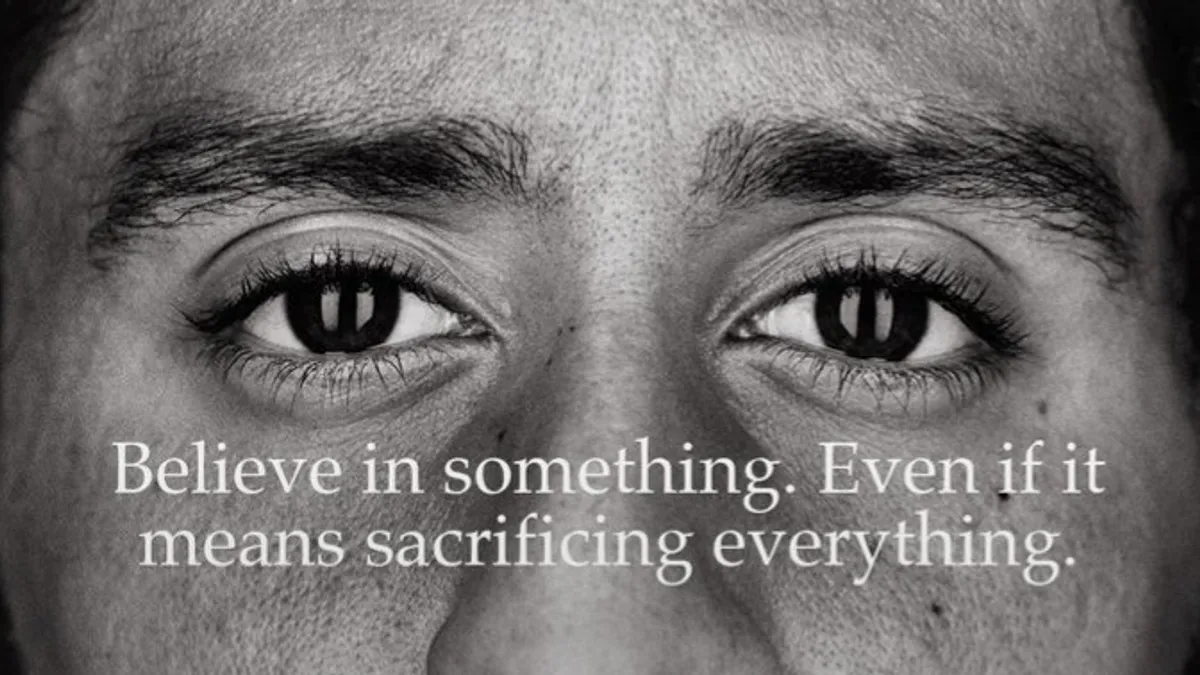UPDATE: July 2, 2019: This story has been updated to include a statement from Nike.
Dive Brief:
-
Nike pulled a special sneaker themed around the July Fourth holiday at the last minute at the behest of Colin Kaepernick, the free agent NFL quarterback and social justice activist, The Wall Street Journal reported. The Air Max 1 USA was planned to go on sale next week, though some sneaker enthusiasts are already trading the item for high prices on the resale website StockX, the Journal said.
- Kaepernick, who's recently worked as a Nike ambassador, reached out to the brand after images were posted online for the shoe, which includes stitching of the Betsy Ross flag design made popular during the American Revolution. Kaepernick took issue with the symbol's ties to a period of history when slavery still existed, which he said could be read as offensive, according to the Journal. Others online pointed to the same problem as Kaepernick. The vintage flag has also been co-opted by some extremist groups, per NAACP commentary cited in the Journal.
- Nike had shipped the Air Max 1 USA units to retailers before requesting they be returned. The company did not detail the reasoning behind the decision to retailers, the Journal's sources said. Kaepernick did not respond to the Journal's request for comment. Following this article's publication, Nike provided the following comment in an email to Marketing Dive: "Nike has chosen not to release the Air Max 1 Quick Strike Fourth of July as it featured an old version of the American flag."
Dive Insight:
Nike has found itself in a lose-lose situation with the sudden Air Max 1 USA recall. The brand first caught skepticism from progressive-leaning camps for the design behind the sneaker, and now faces a social media firestorm and potentially significant business repercussions for reportedly pulling it at the urging of Kaepernick, who's proved to be a lightning rod for controversy. The Nike brand came out mostly unscathed — and arguably stronger with its core audience — following a negative response in some circles around its "Dream Crazy" campaign with Kaepernick last year. Whether the marketer will be able to navigate the more recent controversy as easily remains to be seen.
The fact that the Air Max 1 USA was already produced and shipped signals the reversal is already a costly one for Nike. Public figures, including Ted Cruz, R-Texas, have taken shots at the brand. More dramatically, Arizona Governor Doug Ducey posted on Twitter Tuesday morning that he had called on the Arizona Commerce Authority to "withdraw all financial incentive dollars" that the state was planning to offer Nike to create a new manufacturing plant, Bloomberg reported.
Today was supposed to be a good day in Arizona, with the announcement of a major @Nike investment in Goodyear, AZ. THREAD—>
— Doug Ducey (@dougducey) July 2, 2019
1/
Kaepernick has been a frequent target of Republican politicians for kneeling during the national anthem at NFL games as a form of protest against police brutality. The athlete has argued he was blacklisted by the NFL for his activism, going as far as to sue team owners for colluding to keep him off the field in a case that resulted in a settlement earlier this year.
Nike caused a stir when it first partnered with Kaepernick for "Dream Crazy" in fall of 2018, though the brand's sales have generally improved since then. "Dream Crazy" has become a standout case study for marketers that are eager to cater to millennial and Gen Z consumers through advertising built around social and political causes. While Nike finds itself in a public relations pinch at the moment, the brand reportedly taking Kaepernick's feedback to heart could demonstrate that the company values the athlete as an ambassador.
"The company spent big bucks to work with Colin Kaepernick because the kind of activism he represents speaks to their target audience," Lori Ruggiero, EVP of strategy at North 6th Agency, said in emailed comments to Marketing Dive. "While there has been some blowback on the decision to pull the shoes, it's coming from people who Nike isn't necessarily trying to sell these sneakers to."
But Nike could also be trying to repair some of its reputation as a purposeful marketer. The apparel maker has championed women's empowerment through campaigns with Serena Williams, but received flak after a May opinion piece in The New York Times detailed how Nike financially penalized pregnant athletes. The article and its resulting backlash led Nike to change its maternity policies.
Brands are generally being put under a harsher microscope as purposeful marketing grows in popularity but corporate practices behind the scenes don't always measure up. More companies are being accused of "woke-washing," including from other businesses, in not living up to the progressive values they espouse. Nike last year introduced new diversity goals, such as commitments to put more women and minorities in leadership positions, amid allegations of gender discrimination in the workplace, as reported in the Business of Fashion.















